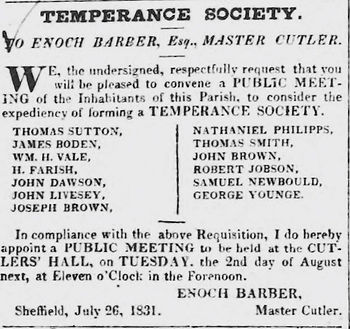How Temperance Started
Founding of a Movement
"The Temperance Movement stands for the Public Interest. The men and women who belong to it have no personal interests to serve, they get no titles or emoluments. They are largely poor people who find great difficulty in maintaining their organisation, and their persistence and fortitude from year to year is often a standing miracle... That is the Temperance Movement. the Temperance Cause, The Temperance Party"
Sir Issac Foot MP for Bodmin 1922-24 & 1929-35

In the early 19th century a new phenomena began to spread throughout a number of States in America. By 1830 contemporary reports laid claim to over 1,000 local Temperance societies with over 100,000 members.
The movement ignited great interest in the British Isles and Ireland. There was particular engrossment in Scotland and the North of Ireland. Campaigners were soon touring, giving lectures, publishing tracts and calling for the establishment of Temperance societies. The Glasgow and West of Scotland Temperance Society are thought to be the first to be founded in the UK.

Across the Pond
Societal Impact

The first Temperance Society in England was formed in Bradford later in 1830.
Soon societies were forming all over England. By the end of the Century the early pioneers were embarking upon a journey that saw the creation of a whole temperance culture. As arguably the most enduring mass movement of the Victorian age, Temperance saw:
-
a myriad of local societies, national organisations, leagues, orders, women and youth groups
-
a vast array of journals covering every aspect of British society
-
Temperance Halls, Hotels and Coffee Houses
-
Hospitals and Orphanages
-
Temperance Societies of the Army & Navy
-
Educational programmes which gave a platform and voice to working class activists
-
Ministers and Clergy of every denomination embracing temperance
Signing of a Pledge
On 1st September 1832 seven men of Preston, Eward Dickinson, John Brodbelt, John Gratix, John Smith, David Anderton, John King and Joseph Livesey signed a pledge.


'We agree to abstain from all liquors of an intoxicating quality whether ale, porter, wine or ardent spirits, except as medicine".
A mass movement had been founded which would have far reaching consequences and benefits for British society. Drinking culture would change and an era of increasing interest and control of alcohol in British society.
Legal or Moral Reform?
Joseph Livesey believed that the way to spread the message was by moral "suasion" (urging individuals to abstinence by personal choice) in contrast to those that saw the answer as legal suppression (employing the coercion of law).
Some looked to change license laws regulating the liquor traffic, Some sought to prohibit sales in by local option laws allowing communities to regulate alcohol sales.
A full timeline can be found here.
"I hear of workmen in armament works who refuse to work a full week for the nation’s need’, he told his audience. ‘What is the reason? Sometimes it is one thing, sometimes it is another, but let us be perfectly candid. It is mostly the lure of drink … Drink is doing more damage in the war than all the German submarines put together."
David Lloyd George’s Bangor Speech in 1915 marked a watershed in political attitudes to alcohol.